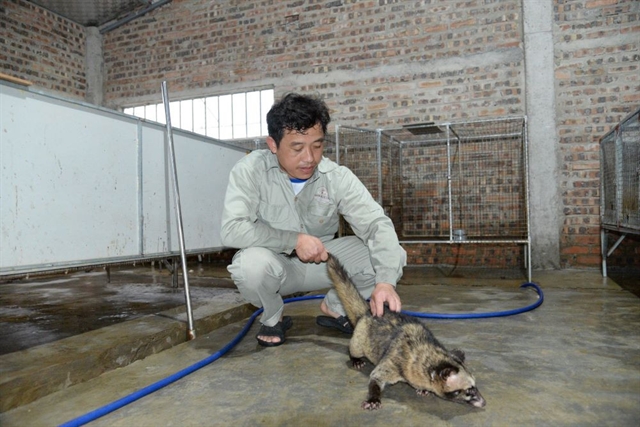 Society
Society

 |
| Mai Khắc Thạch cleaning one of his civets on the farm. Photo vietnamnet.vn |
HÀ TĨNH After obtaining his degree in civil and industrial engineering from Hà Nội University of Civil Engineering, Mai Khắc Thạch opted to utilise his skills differently. He returned to his hometown and opened a civet farming business, which proved highly lucrative and earned him and his partners billions in profit last year.
The Khánh Ngọc Civet Cooperative in Quần Ngọc Hamlet, Khánh Vĩnh Yên Commune, Can Lộc District, Hà Tĩnh Province led by Thạch is one of the province's most effective economic development models.
Having graduated from Hà Nội University of Civil Engineering with a degree in civil and industrial engineering, Thạch's story took a turn after he returned from a job as a contractor on construction projects in Angola. He came home in 2019 because he felt "far from home, tired of construction work, and wanted to return to the countryside to find stable employment."
Thạch then began exploring local economic models and fell in love with civet farming.
"I researched many economic models such as pig and chicken farming but found them ineffective. During my research, I found that the civet farming model of a young person in Hà Tĩnh City was quite successful, providing stable income, so I wanted to follow suit," Thạch recounted.
Within a span of three months, Thạch embarked on a journey to Hà Tĩnh City to delve into the intricacies of civet farming. Guided by experienced professionals in the field, he boldly invested in constructing farm enclosures and kickstarted his venture with an initial stock of 50 civets.
However, the initial phase proved challenging, as Thạch encountered difficulties due to his lack of experience, resulting in gastrointestinal issues among the civets. Through perseverance and hands-on learning, he gleaned valuable insights into civet care, and gradually turned the business into a success.
Impressed by his achievements, many of Thạch's friends expressed interest in collaborating and establishing a cooperative to further develop and expand the civet farming model.
In 2022, Thạch and five friends from Quần Ngọc Hamlet came together to form the Khánh Ngọc Civet Cooperative. The cooperative garnered attention and support from local authorities, with the Can Lộc Forestry Department issuing licences and conducting regular inspections to aid in its growth.
Thanks to this initiative, Thạch's cooperative and his friends have been able to capitalise on their strengths and achieve steady development.
Thạch revealed that the farming area spans nearly one hectare and comprises five breeding sections housing over 300 civets, including more than 200 breeding civets, 50 male civets, and 50 juvenile civets. Commercial civets are typically sold after at least 10 months, while breeding civets are sold within four months.
"We invested about VNĐ5 billion (US$198,000) to build the farm. This money was borrowed and mobilised from members within the cooperative," he said.
With commercial civets fetching prices ranging from VNĐ1.8-2 million ($71-79) per kilogram, and typically weighing between 3-4.5kg, a single civet can bring in considerable revenue. A breeding pair of civets costs around VNĐ10 million ($400). After a year of trial and error, accounting for expenses, the cooperative earned approximately VNĐ1.5 billion ($60,000) in profit last year. This year, they aim to recover their investment capital and continue with restructuring efforts.
A member of the Khánh Ngọc Cooperative shared that civets can start breeding at around 10 months old, averaging two litters per year. It's crucial to provide civets with a food source that ensures cleanliness and freshness for their optimal health and reproduction.
"The weakness of civets is their poor gastrointestinal system, so the food must be guaranteed; otherwise, civets can easily get sick. Bananas are the daily food of civets. In addition, food must be diversified such as fish, snails or chicken necks to prevent civets from getting bored," this member said.
Looking ahead, Thạch outlined plans for the cooperative's growth and development.
"We aim to increase our civet herd from over 300 to about 500 by the end of the year. With this expansion, we anticipate earning approximately VNĐ3 billion ($120,000) in profit by 2024. Currently, there is high demand for our civets due to their guaranteed cleanliness; we are still unable to meet all orders," Thạch revealed.
The leaders of Khánh Vĩnh Yên Commune People's Committee commended Thạch's civet farming model as a novel and successful economic venture in the local area, showing initial effectiveness. VNS




